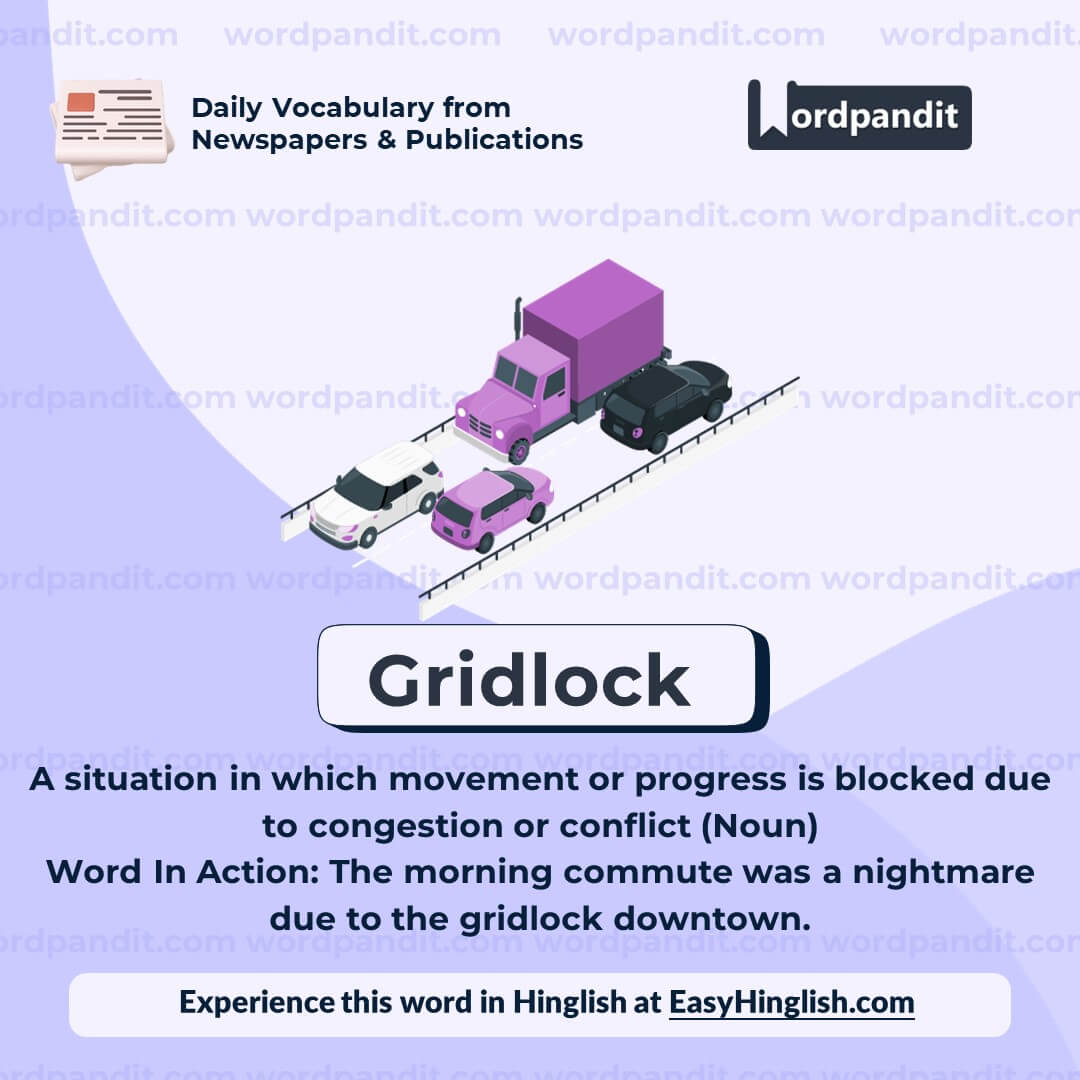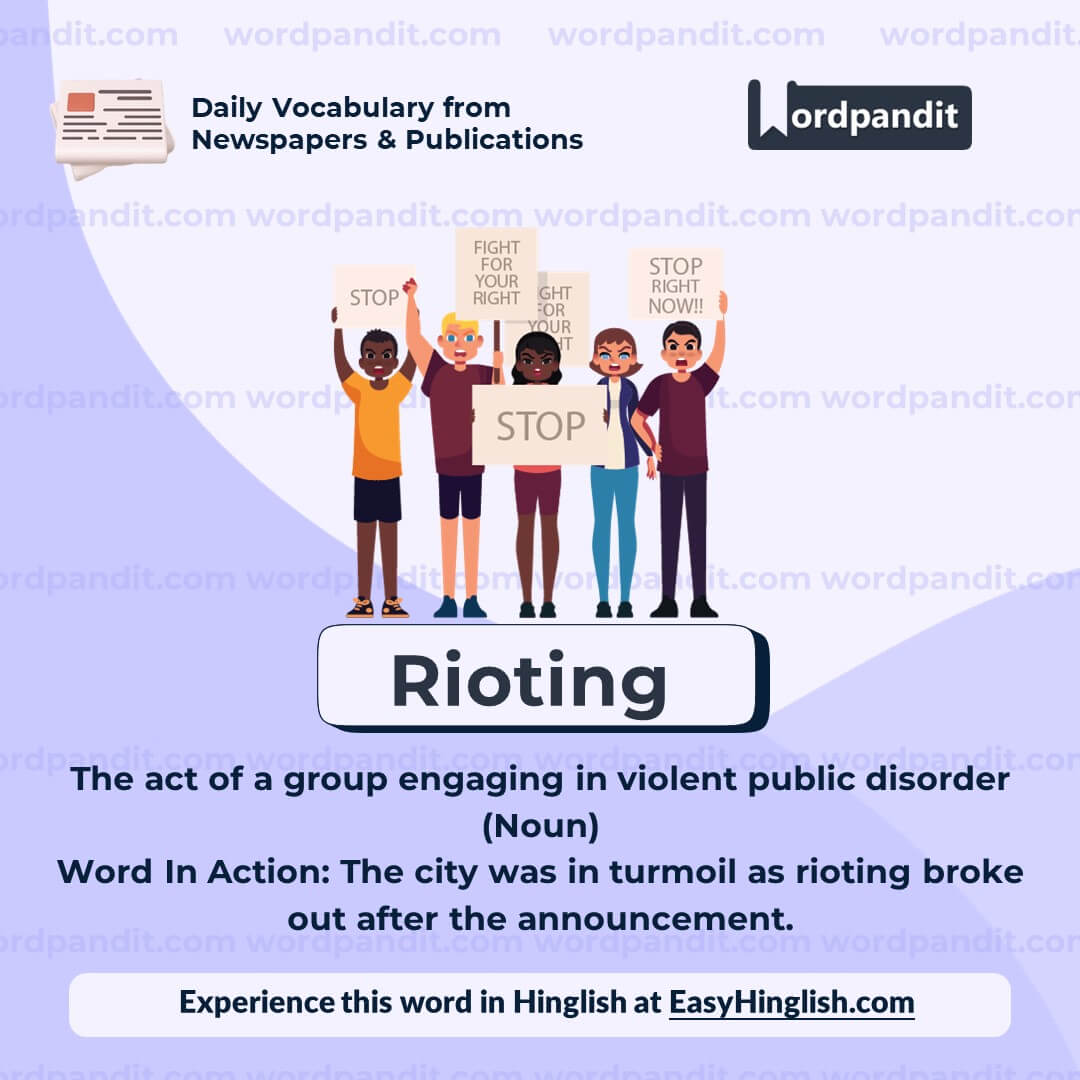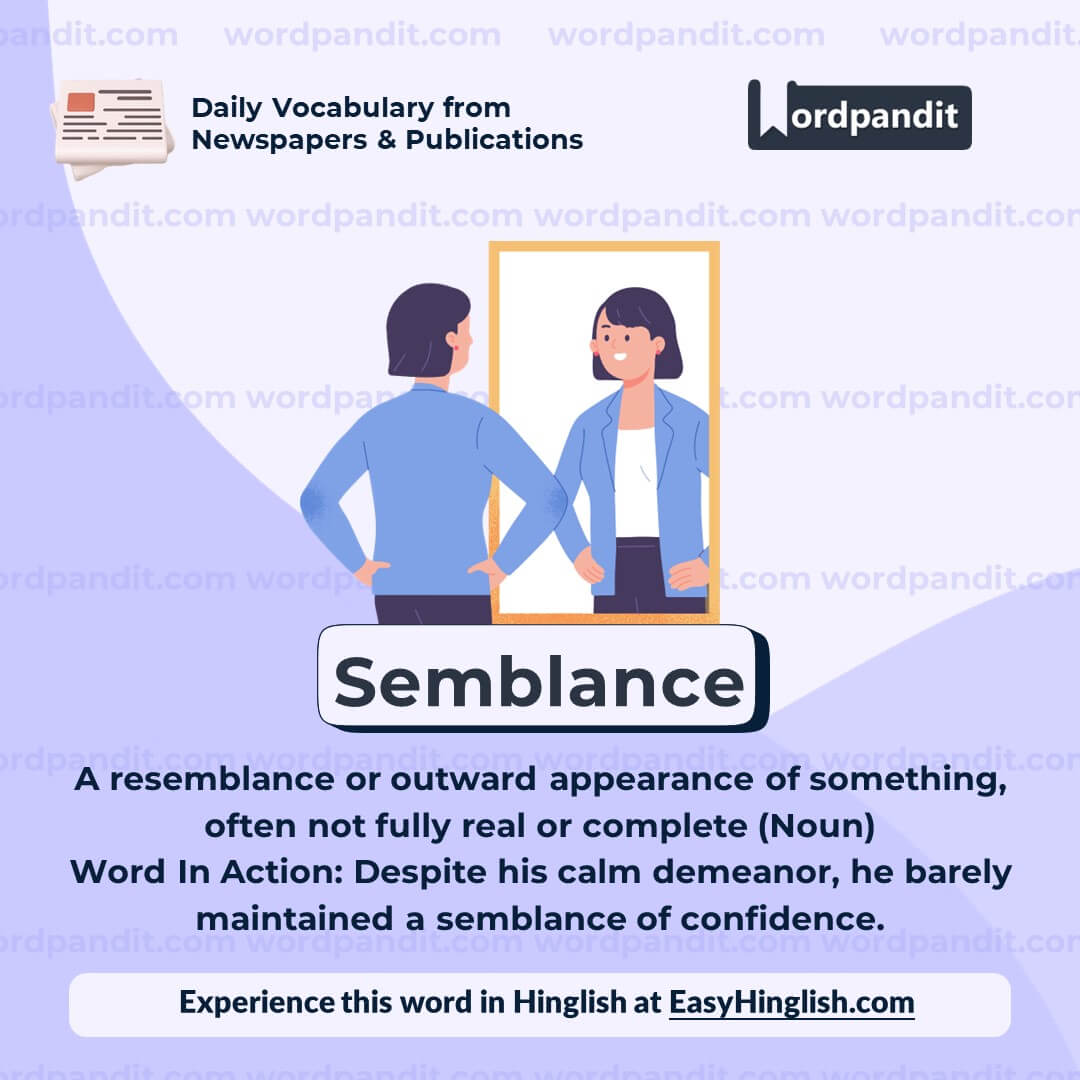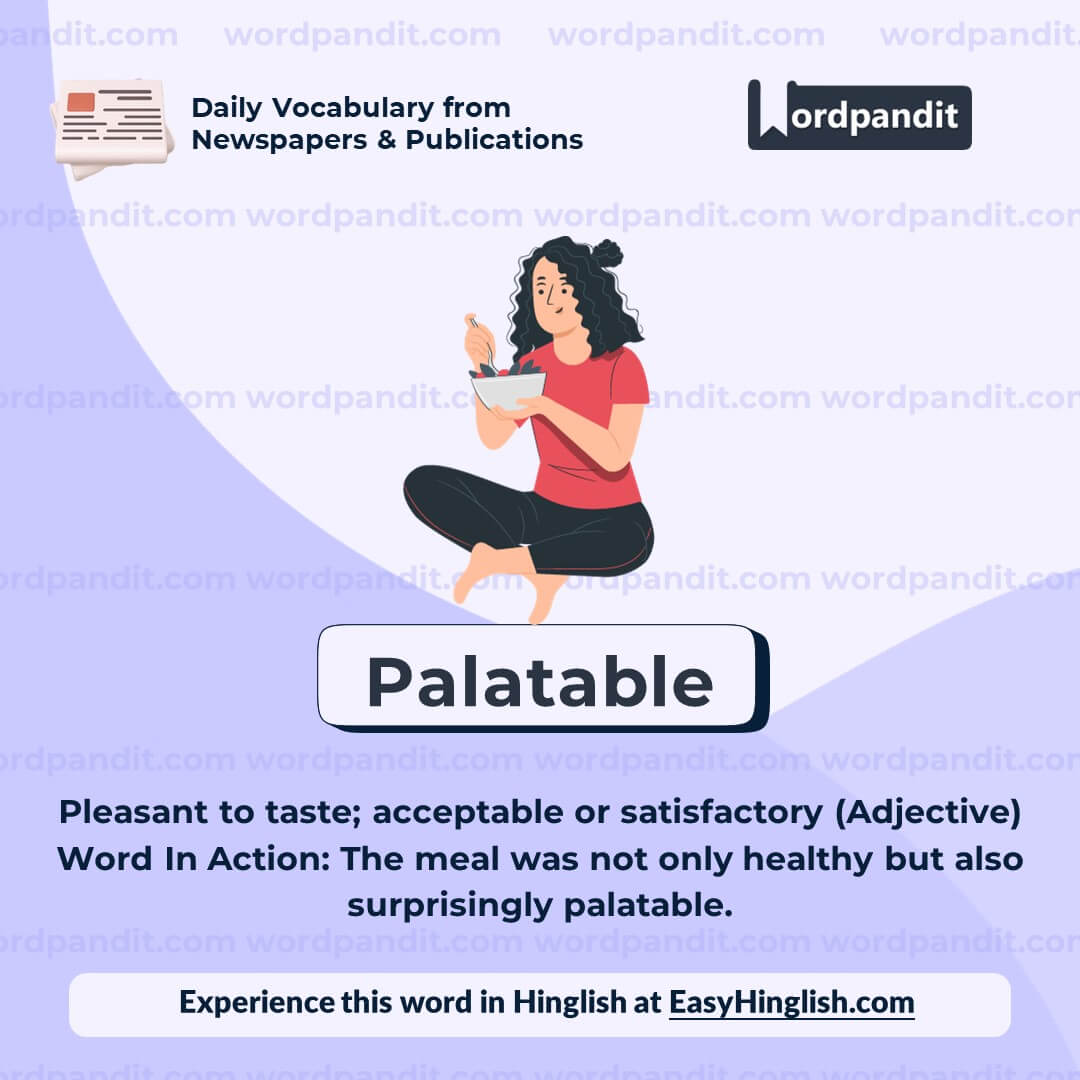Daily Vocabulary from Indian Newspapers and Publications
Welcome to Wordpandit’s Indian Vocabulary Hub
At Wordpandit, we understand the importance of staying rooted in the local context while expanding your language skills. This section focuses on enriching your vocabulary with words and phrases drawn from India’s leading newspapers and publications, ensuring you're learning vocabulary that is practical, relevant, and uniquely Indian.
Why Indian Sources Matter
We believe that the best way to master any language is by immersing yourself in local content. That’s why we carefully curate vocabulary from top Indian publications, including:
- The Hindu
- The Times of India
- The Economic Times
- Hindustan Times
- Live Mint
- The Indian Express
- And many others...
Stay Updated, Stay Relevant
With daily updates from Indian news sources, you’ll be consistently learning words that reflect the trends and shifts in Indian society and culture. Our focus is to provide vocabulary that enhances your understanding of the language in an Indian context.
How Wordpandit Supports Your Goals
Whether you’re preparing for exams, aiming to improve your professional communication, or simply want to stay connected with the latest Indian vocabulary, Wordpandit is here to guide you every step of the way.
Learn with a Practical Approach
Our interactive learning methodology includes real-world examples, engaging activities, and context-specific usage to ensure that every word becomes part of your active vocabulary.
Dive into Indian Vocabulary Today!
Why Choose Wordpandit?
Practical Learning: Focus on words you'll actually encounter in real-world reading, enhancing your comprehension and communication skills.
Diverse Content: From current affairs to scientific breakthroughs, our varied sources expose you to vocabulary across multiple domains.
Effortless Integration: Make Wordpandit a part of your daily routine. Just a few minutes each day can significantly boost your lexicon over time.
Your Path to Vocabulary Mastery
- Visit our Daily Vocabulary section regularly
- Explore new words and their usage in context
- Practice incorporating these words into your own writing and speech
- Track your progress as your vocabulary expands
Start Your Journey Today
Embark on your vocabulary enhancement journey with Wordpandit. By consistently engaging with our daily posts, you'll build a robust vocabulary that serves you well in academic, professional, and personal contexts.
Remember, a word a day keeps linguistic limitations at bay. Make Wordpandit your daily companion in the quest for vocabulary excellence!
WORD-1: Gridlock
Context:
"The administration, on its part, allowed the crowd freer movement across most of the Mela area, avoiding the gridlock of roadblocks that had worsened the crush on Wednesday and set the stage for the stampede." - The Wire
Explanatory Paragraph:
Gridlock refers to a situation where movement is severely restricted due to congestion or obstacles, often leading to complete standstill. While commonly used to describe traffic jams, the term can also apply to legislative or bureaucratic deadlocks where no progress is possible due to opposing forces.
Meaning: A situation in which movement or progress is blocked due to congestion or conflict. (Noun)
Pronunciation: GRID-lok
Difficulty Level: ⭐⭐⭐ Intermediate
Etymology: The term originated in the 1980s in the United States, initially referring to severe traffic congestion in urban areas where intersecting streets were blocked, preventing movement in all directions.
Synonyms & Antonyms:
Synonyms: Traffic jam, bottleneck, deadlock, congestion, impasse, stalemate
Antonyms: Free flow, clearance, smooth passage, resolution
Usage Examples:
- The city’s main highway experienced severe gridlock during rush hour.
- Political gridlock in Congress prevented the passage of the new bill.
- The emergency response team worked swiftly to break the gridlock caused by the collapsed bridge.
- The negotiations reached a gridlock as neither side was willing to compromise.
Cultural Reference:
"Washington’s gridlock is legendary, with opposing parties unable to agree on even the simplest policies." - The New York Times
Think About It:
Can you think of a time when a gridlock—literal or metaphorical—significantly affected a situation you were in? How did you overcome it?
Quick Activity:
Write a short paragraph describing a time you were stuck in a traffic gridlock or faced a metaphorical gridlock in decision-making.
Memory Tip:
Think of "grid" as a network of roads and "lock" as being stuck—when the grid is locked, nothing moves!
Real-World Application:
Understanding gridlock is essential for discussing traffic congestion, urban planning, and even political or business deadlocks where decisions stall due to conflicting interests.
WORD-2: Rioting
Context:
"This was not a case of rioting or murder." - The Wire
Explanatory Paragraph:
Rioting refers to violent and chaotic public disturbances, often involving a large group of people who engage in destructive actions such as vandalism, looting, and clashes with authorities. Riots typically arise due to political unrest, social grievances, or extreme public outrage.
Meaning: The act of a group engaging in violent public disorder. (Noun)
Pronunciation: RYE-oh-ting
Difficulty Level: ⭐⭐⭐ Intermediate
Etymology: From Old French "riote" (dispute, quarrel) and from Latin "rugire" (to roar), indicating loud and violent disturbances.
Synonyms & Antonyms:
Synonyms: Uprising, rebellion, turmoil, chaos, anarchy, insurrection
Antonyms: Peace, order, harmony, lawfulness
Usage Examples:
- The government imposed a curfew to control the rioting in the city.
- Rioting broke out after the controversial court verdict was announced.
- The police struggled to contain the rioting crowds as violence escalated.
- After days of peaceful protests, rioting erupted when agitators infiltrated the march.
Cultural Reference:
"The 1992 Los Angeles riots were sparked by the acquittal of police officers involved in the beating of Rodney King, leading to widespread unrest and destruction." - History.com
Think About It:
Do you think rioting is ever justified as a form of protest, or should all demonstrations remain peaceful? Why?
Quick Activity:
Write a short paragraph explaining the difference between a protest and a riot.
Memory Tip:
Think of "riot" as "run out of control"—when people riot, situations spiral into chaos!
Real-World Application:
Understanding rioting is important in law, politics, and journalism, as it helps in analyzing social movements, civil unrest, and their impact on governance and security.
WORD-3: Glaring
Context:
"It was only after eight days, after an enquiry had also found glaring evidence of the assault, that a case was registered." - The Wire
Explanatory Paragraph:
The word "glaring" is used to describe something extremely obvious, noticeable, or intense. It can refer to a mistake or problem that is too evident to be ignored, or to something bright and harsh, like glaring sunlight. In the given context, "glaring evidence" means evidence that is so clear and undeniable that it cannot be overlooked.
Meaning: Extremely obvious or conspicuous; harshly bright. (Adjective)
Pronunciation: GLAIR-ing
Difficulty Level: ⭐⭐ Beginner
Etymology: From Middle English "glaren," meaning "to shine brightly or fiercely," originating from Old Norse "glára," meaning "to gleam."
Synonyms & Antonyms:
Synonyms: Obvious, blatant, striking, harsh, dazzling, intense
Antonyms: Subtle, hidden, mild, dim, soft
Usage Examples:
- The glaring mistake in the report made it clear that no one had proofread it.
- She stepped outside and shielded her eyes from the glaring sunlight.
- The judge could not ignore the glaring inconsistencies in the witness’s statements.
- His glaring stare made everyone in the room uncomfortable.
Cultural Reference:
"The glaring inequality in wealth distribution has sparked debates worldwide." - The Guardian
Think About It:
Can you think of a situation where a glaring mistake changed the outcome of an event? How could it have been avoided?
Quick Activity:
Write a sentence using "glaring" in a way that describes something obvious and another where it describes something bright.
Memory Tip:
Think of "glaring" as something that makes you "glare" (stare intensely) because it's either too bright or too obvious!
Real-World Application:
The word "glaring" is often used in journalism, law, and daily conversation to emphasize mistakes, contradictions, or anything that stands out strongly.
WORD-4: Semblance
Context:
"Hamas security officials have also re-emerged to assert a semblance of order across the territory, stopping and screening vehicles and trying to defuse unexploded ordnance." - Telegraph India
Explanatory Paragraph:
The word "semblance" refers to an outward appearance or a slight resemblance of something, often without being completely genuine or true. In the given context, "a semblance of order" means that order is being established, but it may not be fully restored or may only appear to exist on the surface.
Meaning: A resemblance or outward appearance of something, often not fully real or complete. (Noun)
Pronunciation: SEM-bluhns
Difficulty Level: ⭐⭐⭐ Intermediate
Etymology: From Old French "semblance," meaning "likeness" or "appearance," derived from Latin "simulare," meaning "to imitate" or "pretend."
Synonyms & Antonyms:
Synonyms: Appearance, illusion, facade, pretense, likeness
Antonyms: Reality, truth, authenticity, substance
Usage Examples:
- Despite the crisis, the government tried to maintain a semblance of normalcy.
- Her smile gave the semblance of happiness, but deep down, she was struggling.
- The restaurant had a semblance of luxury, but the service was poor.
- He tried to keep a semblance of composure after hearing the shocking news.
Cultural Reference:
"In George Orwell's 1984, the government maintains a semblance of fairness, but in reality, it controls everything through propaganda." - Literary Analysis
Think About It:
Can you think of a situation where someone or something had the semblance of being trustworthy but turned out to be deceptive?
Quick Activity:
Write a short paragraph using "semblance" to describe a situation where things are not as they appear.
Memory Tip:
Think of "semblance" as "similar but not quite"—it looks like something real, but it's just an appearance.
Real-World Application:
"Semblance" is often used in news reports, literature, and discussions about politics, leadership, and social structures, where things may not always be what they seem.
WORD-5: Palatable
Context:
"The soup was too bland for my taste, so I added some salt and pepper to make it palatable." - Telegraph India
Explanatory Paragraph:
The word "palatable" describes something that is pleasant to taste or acceptable to the mind. It is often used in the context of food that is flavorful and enjoyable, but it can also refer to ideas or proposals that are agreeable or easier to accept.
Meaning: Pleasant to taste; acceptable or satisfactory. (Adjective)
Pronunciation: PAL-uh-tuh-bul
Difficulty Level: ⭐⭐ Beginner
Etymology: From Latin "palatum," meaning "roof of the mouth," which evolved into the English word referring to something agreeable in taste.
Synonyms & Antonyms:
Synonyms: Tasty, appetizing, agreeable, acceptable, pleasant
Antonyms: Unpalatable, distasteful, unpleasant, disagreeable
Usage Examples:
- The chef adjusted the seasoning to make the dish more palatable.
- His argument was not entirely convincing, but he presented it in a palatable manner.
- Adding honey made the bitter tea more palatable.
- The new policy was designed to be more palatable to the employees.
Cultural Reference:
"In many cuisines, spices are used to make food more palatable and enjoyable for a wider audience." - National Geographic
Think About It:
Can you think of a situation where you had to make an idea or proposal more palatable for others to accept it?
Quick Activity:
Write a sentence using "palatable" in both a literal (food-related) and figurative (idea-related) sense.
Memory Tip:
Think of "palatable" as something that pleases your "palate" (taste buds) or something that is easy to accept.
Real-World Application:
"Palatable" is useful when discussing food, business proposals, political decisions, and even entertainment, where something needs to be appealing to an audience.



















